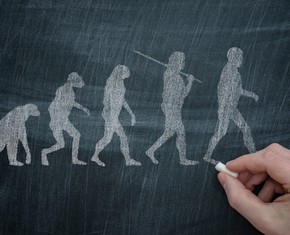The views expressed in our content reflect individual perspectives and do not represent the authoritative views of the Baha'i Faith.
Defending the motion that science refutes God, atheist physicist Lawrence Krauss tickled my science fiction funny bone by invoking the X-Files.
Krauss cited Fox Mulder from the ever-popular TV show, and in the process made a very strange claim:
There’s no need for a divinity; laws of nature describable by mathematics make predictions that allow us to—not only to predict the future, but control it, without the need for any supernatural shenanigans. And, in fact, it amazes me that asking the question, “Is God necessary?” is somehow an evil thing. When we stop asking questions, that will be an evil thing. Science has taught us also that we want to believe (in the words of Fox Mulder). (emphasis added)
That’s quite a claim: That we can predict the future, and control it. I’d love to know how he reconciles this with the deterministic universe he posited earlier in the original “Science Refutes God” debate, in which everything is pre-ordained—including all human thought and action. If we could control the future, we would not be staring down the barrel of so many seemingly intractable problems—many of which we ourselves have caused.
Here I cannot stress enough that these problems can be controlled, but only by the marshaling of attitudes and the application of forces that are, according to Krauss, unscientific—based as they are in religious teaching.
Whether we’re talking about poverty, gun violence, war, racism, or climate change, the mere application of mathematics or scientific principle will not allow us to control the future or solve those pressing problems. There is an element missing that is not a scientific truth, but a spiritual one—as Abdu’l-Baha would say, an ideal verity or intellectual reality. Science has confirmed what religion has told us for millennia—that we are all members of one human family. But science cannot tell us how to act on that knowledge. That must come from elsewhere.
I’m going to go out on a limb here and propose that Krauss and other atheists know this. Which brings me to his point about questioning the need for God: the question itself is not evil. As a Baha’i dedicated to the foundational principle of my faith that questions are necessary to the independent investigation of reality, I see questions as good. If we answer them honestly, they help us clarify the world within and around us. What is evil is the dogmatic assertion that God is not necessary and that, therefore, we need pay no attention to anything that comes to us from a religious or spiritual sphere. With an attitude that prejudiced and intractable, all the math in the world can only amount to a meaningless pile of numbers.
Going further with his X-Files reference, Krauss continues:
And we should be skeptical of those desires. As the physicist Richard Feynman told us, the easiest people to fool are ourselves. As scientists, we have to train ourselves to be skeptical of wanting to believe. And we should try and overcome our natural tendency to assume special significance to events. And human beings are also inevitably programmed to ask, “Why?” as we’ve heard it. But the “Why?” question is ill-posed, because it presumes purpose.…
What if there is no purpose? Does there need to be purpose? And science tells us there’s no evidence of purpose. …Our opponents want to keep the clock from ticking by avoiding the evidence … [Science], by telling us there’s no need for purpose, has refuted the need for God…. (emphasis added)
Despite his seemingly arbitrary assertion that “science tells us there’s no evidence of purpose,” Krauss makes a good point about belief and skepticism—though he doesn’t seem to grasp that it applies equally to his own cherished beliefs. His invoking of the X-Files is ironic in that context; most fans of the show understood that Mulder was the true skeptic, while Scully was a victim of her own dogmatic thinking—the poster child for the idea that we should be equally skeptical of the desire to make science (or ourselves) into a god.
Baha’u’llah, founder of the Baha’i Faith, in one of his most-quoted passages, notes that the true seeker after knowledge:
… must so cleanse his heart that no remnant of either love or hate may linger therein, lest that love blindly incline him to error, or that hate repel him away from the truth. – Gleanings from the Writings of Baha’u’llah, p. 282.
So can a true skeptic or a true scientist, someone who believes in the independent investigation of the truth, ever completely rule out the existence of a Creator? I’d venture to say that the answer is no.
You May Also Like
Comments

















So, excellent article, ...again, and yes, we do believe, at least in our own existence. And that is a belief we'll take to our graves.
Maya! We are all prone to narrow
vision, but some of us are too narrow to see that about ourselves.